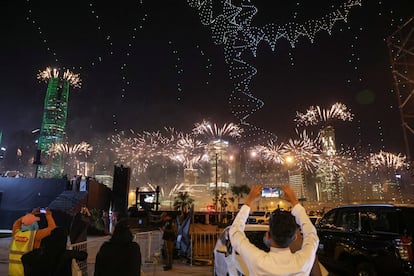Saudi Arabia’s capital Riyadh chosen to host the 2030 World Expo
Riyadh beat Rome and the South Korean port city of Busan. The Saudi bid had notably received official support from French President Emmanuel Macron

Saudi Arabia’s capital Riyadh was chosen Tuesday to host the 2030 World Expo following its bid that focused on shaping a prosperous and sustainable future, beating out Rome and the South Korean port city of Busan for an event expected to draw millions of visitors.
Members of the Paris-based Bureau International des Expositions chose Riyadh with a majority of 119 out of 165 votes during a closed-door meeting in the suburb of Issy-les-Moulineaux. Busan got 29 votes and Rome 17. The result was greeted with cheers by the Saudi delegation.
Saudi Arabia’s foreign minister, Prince Faisal bin Farhan, welcomed the vote as an “expression of the trust that the international community has in what we have to offer… but also in its alignment with our own vision (for) 2030 and everything that we advocate for, which is a shared pathway to prosperity for all of the countries of the world.”
“We are committed to living up to the expectations and delivering an extraordinary expo,” he said. The Saudi plans include a major public transit network and a futuristic, round space with public parks, e-game facilities, large scale performance stages and sport venues. The project includes a focus on “accelerating innovations” to preserve natural ecosystems.
“The legacy of Riyadh Expo 2030 will go beyond the buildings,” Prince Faisal added, promising “fantastic” architecture. “We are about a journey, a journey that brings the world together... So that will be the legacy, working together for a brighter, more prosperous future.”
Saudi Arabia hopes the Expo will bring 40 million of visitors to its capital city. With the stakes high, each city escalated its campaign efforts, showcasing unique visions and ambitious promises to secure the rights to the globally prestigious event.
Saudi Arabia mounted a significant marketing campaign, featuring a “Riyadh 2030″ exhibit near the Eiffel Tower and extensive advertising across Paris. The Saudi bid, seeking to diversify the kingdom’s economy and boost its international stature, had notably received official support from French President Emmanuel Macron.
Some activists denounced Riyadh’s candidacy amid allegations that the country violates human rights, including the 2018 murder of dissident journalist Jamal Khashoggi in the Saudi Consulate in Istanbul.
Rome had enlisted actor Russell Crowe, who appeared in a promotional video echoing his “Gladiator” persona, to underscore the city’s readiness for the Expo. Rome’s bid included plans for the world’s largest urban solar park and a green corridor connecting the Expo site to historic landmarks like the Appia Antica (Appian Way), one of the oldest and most important roads of the Roman Empire.
The South Korean port city of Busan had brought in cultural heavyweights like “Gangnam Style” rapper Psy and K-pop supergroup BTS to bolster its bid. The city was positioning itself for a high-tech Expo, emphasizing its capabilities in artificial intelligence and 6G technology with the aim of attracting millions of visitors and spurring job creation.
The World Expo has a storied history of bringing together nations to showcase technological innovations and cultural achievements. Since the inaugural event in 1851, Expos have been platforms for introducing groundbreaking inventions such as the light bulb, the Ferris wheel and the Eiffel Tower itself, which was built for the 1889 Exposition Universelle.
These events have evolved to not only be celebrations of human ingenuity, but also opportunities for host cities to catalyze economic growth and global recognition.
They generally are held every five years, with the next one scheduled in Osaka, Japan, in 2025.
Sign up for our weekly newsletter to get more English-language news coverage from EL PAÍS USA Edition
Tu suscripción se está usando en otro dispositivo
¿Quieres añadir otro usuario a tu suscripción?
Si continúas leyendo en este dispositivo, no se podrá leer en el otro.
FlechaTu suscripción se está usando en otro dispositivo y solo puedes acceder a EL PAÍS desde un dispositivo a la vez.
Si quieres compartir tu cuenta, cambia tu suscripción a la modalidad Premium, así podrás añadir otro usuario. Cada uno accederá con su propia cuenta de email, lo que os permitirá personalizar vuestra experiencia en EL PAÍS.
¿Tienes una suscripción de empresa? Accede aquí para contratar más cuentas.
En el caso de no saber quién está usando tu cuenta, te recomendamos cambiar tu contraseña aquí.
Si decides continuar compartiendo tu cuenta, este mensaje se mostrará en tu dispositivo y en el de la otra persona que está usando tu cuenta de forma indefinida, afectando a tu experiencia de lectura. Puedes consultar aquí los términos y condiciones de la suscripción digital.








































